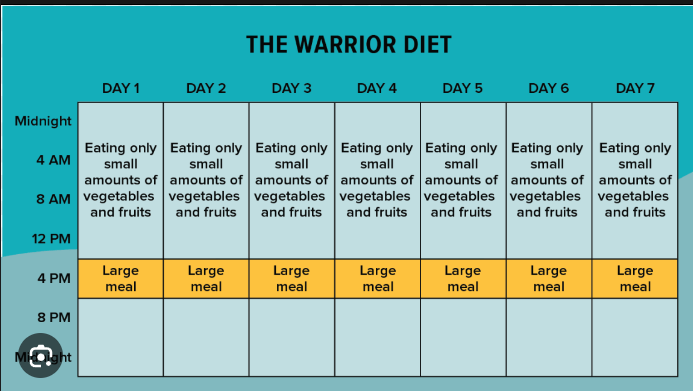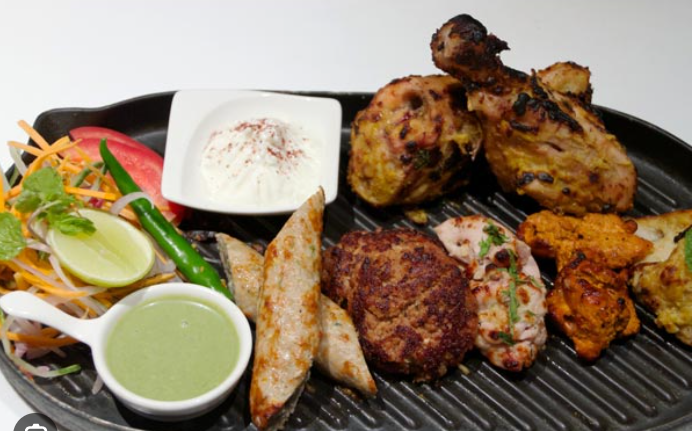A dietitian discusses the Warrior Diet, what to eat, and whether or not this severe form of intermittent fasting will result in weight loss.
The Warrior Diet promotes extended fasting for 20 hours a day with little food intake, followed by four hours of binge eating in the evening. It is based on the traditional eating habits of warriors. Weight loss and purported health benefits, such as increased energy and mental clarity, are the promised outcomes of the warrior diet.

Also read–Exercise: Expert-Approved Tips To Make Exercise A Habit For Healthy Body
Experts, however, question this strategy and caution that stringent dietary restrictions may be harmful to one’s health.
What is the warrior diet?
Ori Hofmekler, the founder of Defense Nutrition and a former member of the Israeli Special Forces, created the Warrior Diet in 2001. It is not grounded in medical research on weight loss or health benefits, but rather in Hofmekler’s views and observations.

The concept of intermittent fasting, also known as the 20:4 diet, is comparable to time-restricted eating but involves significantly shorter eating intervals and longer fasting periods. There are parallels between the Warrior Diet and the One Meal a Day (OMAD) diet.
Dieters who adhere to the Warrior Diet are recommended to perform short bursts of physical activity, such as sprints, kicks, and jumps, and to eat less or not at all during the day. Dieters consume one substantial meal during the four-hour window at dinnertime. Preservative-free, nutrient-dense, unprocessed whole foods without added sugars or artificial sweeteners are advised.

Dietitian Bonnie Taub-Dix, the creator of BetterThanDieting.com and the author of “Read It Before You Eat It,” observes that the encouragement of unprocessed, healthful, and organic food choices “makes no appreciable difference, as if that would bring even a modicum of health to this plan.”
The Warrior Diet is characterized as “ridiculous” by Taub-Dix.
How does the warrior diet work?
The diet works by undereating or fasting for 20 hours per day, then consuming unrestricted amounts of specified foods at night.
Hofmekler claims that fasting for 20 hours each day triggers “survival instincts” and promotes fat loss, uses protein more efficiently, increases hormone levels, fosters stable blood sugar levels, and enhances brain health to “improve the way we eat, feel, perform, and look.”

“There is no scientific data to suggest the Warrior Diet can increase your energy levels or mental clarity whatsoever,” says Taylor Wallace, food and nutrition research scientist and CEO of Think Healthy Group. “All we have is anecdotal evidence that is probably plagued by the placebo effect.”
How to follow the warrior diet
The diet works by undereating or fasting for 20 hours per day, then consuming unrestricted amounts of specified foods at night.
Hofmekler claims that fasting for 20 hours each day triggers “survival instincts” and promotes fat loss, uses protein more efficiently, increases hormone levels, fosters stable blood sugar levels, and enhances brain health to “improve the way we eat, feel, perform, and look.”

“There is no scientific data to suggest the Warrior Diet can increase your energy levels or mental clarity whatsoever,” says Taylor Wallace, food and nutrition research scientist and CEO of Think Healthy Group. “All we have is anecdotal evidence that is probably plagued by the placebo effect.”
How to follow the warrior diet
Initially, warrior dieters follow a three-week multiphase plan:
How much weight can you lose on the warrior diet?
If you are only permitted to eat for a few hours in the evening, you can lose weight temporarily, but is this a healthy strategy? Restricting calories to an extreme degree ought to cause weight loss. On the other hand, evening food binges and excess consumption may undermine weight-loss efforts.
Wallace claims that there hasn’t been any noticeable long-term weight loss with the Warrior Diet (like most diets). Wallace continues, “It is not feasible to maintain a 20-hour fast over an extended period of time, nor is it easy to consume a day’s worth of wholesome calories and nutrients in four hours.”

It is significant to remember that extreme calorie restriction lowers basal metabolic rate, which facilitates weight gain upon returning to normal eating patterns.
Wallace claims that restrictive dieting is not practical for most people in today’s world and is not sustainable. The best strategy for long-term success and weight maintenance, according to him, is to gradually incorporate tiny, healthy changes.
What foods can you eat on the warrior diet?

During the 20-hour fast, you’re allowed to eat small amounts of:
- Dairy products.
- Eggs.
- Raw fruits and vegetables.
- Calorie-free beverages.
Foods not allowed on the diet include:
- Candy.
- Cookies.
- Cakes.
- Chips.
- Fast food.
- Fried foods.
Is the warrior diet healthy?
Experts disagree that the Warrior Diet is a healthy diet.
While the Warrior Diet and 20-hour fasts have received little scientific attention, other forms of intermittent fasting have been demonstrated to aid in weight loss.

A variety of diets that alternate between fasting and non-fasting periods are grouped together under the term “intermittent fasting.” There are several strategies for varying days of fasting, such as fasting for two days on alternate days or up to four days a week. The 16:8 method is a well-liked variation where dieters eat healthily for the remaining eight hours of each day and fast for 16 hours.
Who should not follow the warrior diet?
This diet isn’t for you if you’ve been struggling with your weight.
“It’s better to eat in a way that makes you feel satisfied than to follow a restrictive plan based on warriors who were out all day hunting, hardly eating, and then bingeing on whatever they killed,” advises Taub-Dix.

A lengthy list of people should not adhere to this diet consists of:
- Children.
- Pregnant and lactating women.
- Anyone with a medical condition.
- Athletes.
- People with eating disorders.
- Underweight individuals.
Warrior diet: The bottom line
Because it is difficult to ignore hunger for extended periods of time, The Warrior Diet is an extremely strict regimen that is challenging to stick to.
“There may be people who can tolerate hunger and follow this diet, but every individual is different in their ability to adhere, withstand, and tolerate a diet plan,” says Wallace. Wallace advises making sure you get all of the food groups and nutrients you need if you decide to follow the Warrior Diet.

With the restrictions on the eating plan, going out to dinner or celebrating may be challenging. Exercise during the fasting period may also be challenging due to low blood sugar and low energy.
Pros
- Short-term weight loss.
Cons
- Extreme hunger.
- Not sustainable or suitable for most overweight people.
- Hard to meet nutrient needs.
- Low blood sugar and energy during the fast.
- Could promote disordered eating.
- Controlling food intake during the eating phase.
- Potential serious side effects.
- Very rigid plan.
Also read-Exercises For Men: Essential Workouts For Your Fitness Routine For Healthy Life
Disclaimer: The opinions and suggestions expressed in this article are solely those of the individual analysts. These are not the opinions of HNN. For more, please consult with your doctor.
Images source-Google




































